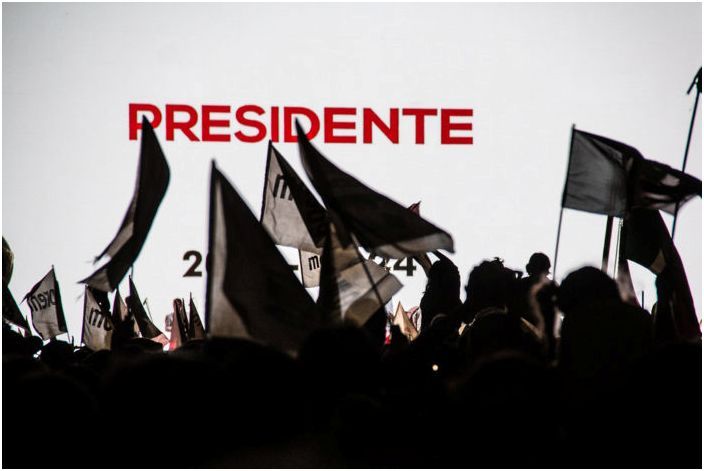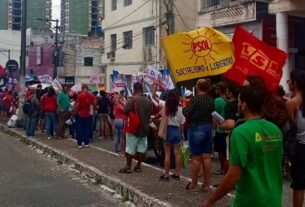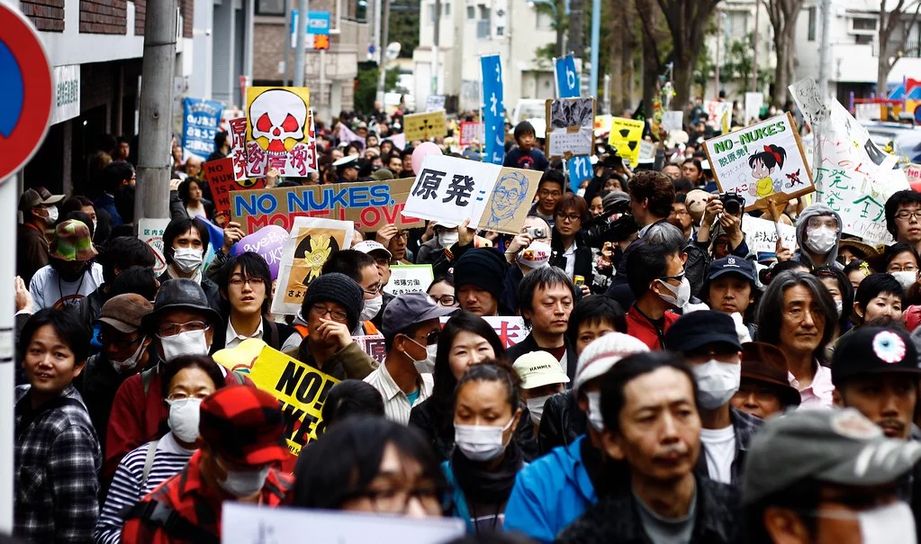David Elliott is a member of ISA Australia.
Note that the following article contains names of people who have died.
Recently, hundreds protested around the country against the ongoing outrage of Indigenous deaths in custody. Rallies were held in Melbourne, Sydney, Brisbane, Alice Springs, and Lismore.
The actions marked the 30th anniversary of the 1991 Royal Commission into Aboriginal Deaths in Custody. With an organized movement, we can win change and prevent further deaths, but the issue will never be fully solved unless we challenge the ongoing source of racism – the capitalist system.
Deaths in custody are driven by racism
In the last 30 years, more than 470 Indigenous people have died in custody. In the five weeks leading up to the anniversary, five Indigenous people died in custody in Australia – one every week.
Indigenous people are jailed at a much higher rate than non-Indigenous people. 28 percent of the adult prison population, and 53 percent of the youth detention population, are Indigenous, despite making up 3.3 percent of the Australian population.
Those who have died in custody are three times more likely to have not gotten proper medical care than non-Indigenous people. According to a Guardian Australia analysis, police, prisons and hospitals failed to follow their own procedures 62 percent of the time when an Indigenous person died in custody, compared to 18 percent of the time in cases of a non-Indigenous person dying in custody.
Indigenous people are more likely to be targeted by police. In Western Australia, they are 3.2 times more likely to receive fines after being pulled over by police, even though the rate of fines produced by traffic cameras is the same between Indigenous and non-Indigenous people.
A quarter of those who died in police custody were arrested for offences relating to alcohol, “disorderly conduct,” or unpaid fines. Indigenous people are more likely to be stopped for non-violent offenses, with police even stopping Aboriginal people for things like swearing.
Children funneled into prisons
Police also target Indigenous children. Michael Anderson of the Euahlayi nation of northern New South Wales has said, “police blatantly target our kids and pull them up for what some of the kids say is nothing, and then antagonise them by making accusations, causing the kids to react, which in most cases results in them being charged with minor misdemeanors.”
There is a modern Stolen Generation of Aboriginal children. The number of Indigenous children in “out of home care” doubled from 2006–2016. The Australian Institute of Health and Welfare has reported that children in out-of-home care are 16 times more likely to end up in the youth legal system, within the same year they are taken out of home. Having a criminal record early increases the chance of ending up in the prison system later in life.
In 2016 a Four Corners investigation exposed verbal and physical abuse of children in the Don Dale Youth Detention Centre in the Northern Territory (NT). At the time of the investigation, every single child in detention in the Northern Territory was Indigenous. Similar abuses are reported in youth detention across the country.
The fear of public outrage forced the government to respond. They set up the Royal Commission into the Detention and Protection of Children in the Northern Territory. In 2017, the Commission recommended the Don Dale facility be shut down. It also recommended raising the age of criminal responsibility from 10 to 12, with most submissions to the commission saying it should be raised to 14.
Don Dale is still operating, with new abuses revealed since the royal commission. The NT government is planning to build a new youth detention facility to succeed it. State and federal governments have done almost nothing to implement the recommendations of the commission.
Instead, the NT Labor government is proposing to make it easier to arrest and incarcerate children, by making it harder to get bail. They claim this is a “tough on crime” approach, but in reality, these policies create crime. They create antisocial behavior by traumatizing children, throwing them into prison at a formative age.
The same thing happens when you have adult police officers bullying children. Racist police need to be sacked outright. But the problem is not just with individual officers. Police are directed ultimately by capitalist governments, which benefit from spreading racist ideas.
Racism is a tool of capitalism
In 2007, the government suspended the Racial Discrimination Act and sent the army into Indigenous communities, as part of the Northern Territory Intervention. The Intervention was justified with racist ideas about an epidemic of child abuse in Indigenous communities, despite the fact that the rate of abuse was no higher than non-Indigenous communities. The Intervention was used to push back gains that had been made by Aboriginal people in the past, and make communities more ripe for exploitation by capitalists.
“Cashless Welfare” and “Work for the Dole” were both rolled out in Indigenous communities first. Both policies were promoted with racist ideas about Indigenous people’s handling of their own finances or willingness to work. They used racism as the thin end of the wedge to make welfare harder to survive on. Attacks on welfare are about forcing unemployed people to say yes to any job, no matter how bad the pay and conditions. This drives down wages and conditions for everyone else.
Racist ideas about remote communities are used to justify cutting off funding and closing them down. Capitalists want to open up land and resources for exploitation, as they have in Australia since 1788. Two hundred years ago this was led by the wool industry, today it is largely the mining industry. Aboriginal culture is belittled in order to break the connections between people and their land. This is turn makes it easier to appropriate that land for private profit.
Most of all, capitalists want to intensify the exploitation of working class people wherever possible. The work we do is the source of capitalist profit. Capitalists make less profit when working people stand alongside each other and take collective action to win back wages and conditions. So racism is a way to pit working people against each other, and to isolate some sections of the working class for more ruthless exploitation.
No trust in capitalist governments
The original royal commission in 1991 happened in the context of a decade of growing protests for Indigenous rights in Australia. 1988 saw tens of thousands of people protesting the celebration of January 26 as “Australia Day.” Widespread outrage existed after prominent cases of police murders of Aboriginal people.
The commission made 339 recommendations, covering decriminalizing minor offences, using arrest as a tool of last resort, providing legal services so that Indigenous people have more power to navigate the legal system, and allowing for a degree of self-determination through Indigenous control of services.
Among them was the recommendation that the crime of public drunkenness be abolished. This crime is often used by police to target Indigenous people. This is the offence Tanya Day was arrested for in 2017, when she died in the custody of Victoria Police. It was the same crime her uncle had been arrested for, before he died in police custody in 1982 – one of the cases looked at by the original commission.
The Andrews government in Victoria did nothing until outrage over the death of Tanya Day forced them to change the law – but this change won’t even come into effect until November 2022. If the 1991 recommendations had been treated seriously by governments, Tanya Day would still be alive.
Governments around Australia have given police greater powers to arrest in recent years. Prison penalties have been increased in many places, and bail rights are being undermined right now in the Northern Territory by the Labor government there. Children continue to be locked up by police.
These governments would not voluntarily agree to limit police powers, because they need police. Police play the role of attacking picket lines of striking workers and breaking up protests. Their job involves protecting capitalist profits from working class people. A movement that addresses racism and police violence will find itself in conflict with capitalism.
We need a mass movement to fight the capitalist system
Indigenous communities are denied funds and social infrastructure. There is so much wealth in society that nobody should have to live in poverty, but this wealth is hoarded as profit. This is ultimately the reason Indigenous people suffer low wages, racism, intergenerational poverty and trauma. Poverty is one of the biggest factors in people ending up in the prison system.
Capitalism blames impoverished communities for their situation. Racism is one of the key tools used to do this – it is a way to put blame for poverty and social disadvantage onto the people who suffer it. This means deflecting blame away from the capitalist system, which actually creates poverty. You cannot have capitalism without racism. Even though we have won victories against racist ideas in the past, the system continually recreates these ideas.
Although there are current charges laid against police and prison officers in Western Australia and New South Wales, and the trial of Zachary Rolfe over the murder of Kumanjayi Walker is set to begin in July, to date no Australian police officer has been convicted of the death of an Indigenous person in custody.
In the US, killer cop Derek Chauvin has been found guilty of the murder of George Floyd. It is rare for a police officer in the US to be charged for murder committed on the job, and even rarer for one to be convicted.
Chauvin’s conviction is not any vindication of the justice system. Kshama Sawant, socialist Seattle city council-member and ISA member in the US, pointed out:
“We should be crystal clear that this verdict is entirely due to the Black Lives Matter protests last summer, which became the largest protest movement in American history. It is a testament to the power of mass action with multiracial, working-class solidarity. All credit goes to the rank-and-file activists in the Black Lives Matter movement for this victory, and particularly to the leadership of the youth.”
The enormous Black Lives Matter movement spread to every corner of the globe. In Australia last year, 100,000 people turned out across the country, in some cases defying lockdown orders, to join these protests. The protests should be made a priority of the union movement – if marches were backed up with strike action, it would take the movement to a new level. Working people can bring the system to a halt, and directly impact big business profits.
We can’t rely on capitalist governments making changes of their own accord. We have to fight for control of society by working people. Self-determination is only possible if average people, both Indigenous and non-Indigenous workers, have control of industry. At the moment, the major parts of the economy are held in private hands and run for private profit. Profit is the reason that racism is constantly given new life.
The fight against racism requires a fight for workers’ control, instead of capitalist private ownership of the economy, and for local communities to have democratic control over their resources and wealth. This would take away the driving forces behind racism and brutal policing.
With an organized movement setting its own demands, we can win much more than a few convictions. We have to fight for real reforms, and ultimately to bring an end to capitalism. We need to fight for a democratic socialist society where the wealth is collectively owned, and there is actual self-determination for all people.
Stop funneling children into the prison system:
- Raise the age of criminal responsibility to 18 – no prison sentences for children
- Invest in culturally appropriate diversion programs and other community services
- End stolen generation practices – prioritize home-based support, kinship care, and community care so that children removed from their home are supported within their own community and culture
- Invest in support that eliminates poverty as a reason for children being removed from home
Fight racist policing:
- Abolish prison sentences for minor offences
- Abolish “public order” offences that are used to criminalise things like drunkenness, swearing or insulting a police officer
- For independent bodies made up of working class people to oversee investigations into police – police should not be trusted to investigate themselves
- Jail killer cops and vigilantes, as well as prison guards found to have tortured children
- Sack racist police, prison officers and judges
- For the police to be placed under the democratic control of elected boards of ordinary people, representative of the communities they police
Put the wealth under community control:
- Funding for Indigenous community-controlled legal services
- Funding for mental health services
- Invest in health, education, housing and social services – create jobs that serve the community
- End welfare quarantining and work for the dole – raise unemployment payments to a living wage
- Genuine self-determination through land rights and democratic community control of resources
- Bring the major sectors of the economy into community hands and create a society run in the interests of everyone




